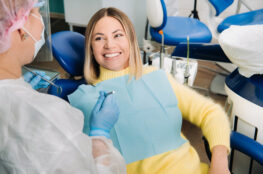We would all like to wave a magic wand or snap our fingers and suddenly have whiter teeth, but in reality, some of our “time and money saving” tooth whitening tricks are actually making our teeth worse.
Dental life hacks or DIY tooth whitening are popular searches on social media or video hosting sites. Let’s be honest, there’s not much we wouldn’t try to improve our aesthetic look if it’s cheap and easy. Here’s the thing though, some of these so-called “life hacks” can actually make your pearly whites more yellow in the long run. Desired effect? We think not
Here are three popular dental fads we think you should be careful of, for your overall dental health and the appearance of your teeth.
1. Hydrogen peroxide.
You know the stuff that hairdressers use to bleach people’s hair, the dangerous chemical they must wear gloves while handling and dispose of responsibly? Yes, people are applying undiluted peroxide to their teeth in a DIY attempt to bleach them. These people are seriously misinformed if they think this is safe to do. Perhaps they thought that because some shop-bought whitening toothpastes and mouthwashes contain small amounts of this chemical, that a purer form would do the job quicker. Although peroxide does make whatever it touches lighter, it’s not as simple as that.
While small, diluted amounts of the chemical are safe and therefore used in approved dental treatments, high levels of the substance can harm your teeth, your gums and potentially your health. It’s essentially bleach, after all. Healthline advises that “peroxide can cause significant damage to the protective enamel of teeth if used too often or in too-high concentrations. More serious side effects of hydrogen peroxide whitening include inflammation of the teeth roots in the gums. This problem can lead to secondary issues, such as infection, which can be expensive to treat.” We can’t stress this enough: do not put pure hydrogen peroxide on your teeth, no matter what you’ve seen on tiktok.

2. Charcoal
Healthline describes activated charcoal as “one of the biggest trends in the world of wellness and cosmetics” and with good reason. It’s become a very trendy ingredient in dental products and skincare alike in recent years, but does it work and is it safe to use? Well according to Healthline.com activated charcoal powder may have some benefits however, it has not been proven that whitening is one of them. They write that “charcoal toothpaste is too abrasive for everyday use. Using a material that’s too abrasive on your teeth can wear down your enamel. This may make your teeth look more yellow by exposing the dentin, a calcified yellow tissue. It can also make your teeth more sensitive.” So, like the peroxide, it can wear away the enamel on your teeth, leaving them open to further staining. It has also been suggested that the black particles could become lodged in the crevasses they create in the surface of the tooth which will make your teeth appear darker from a distance.
Something else to consider is that lots of charcoal toothpastes don’t contain fluoride so it should never be used as a substitute for actual toothpaste. Using charcoal toothpaste instead of a dentist approved one could leave your teeth unprotected from the sugar and acid in your diet, erode the surface of the enamel and increase the sensitivity of your teeth. It’s not what you’d call ideal.
3. Baking soda.
With or without lemon juice, homemade whitening solutions containing baking soda can be harmful to your teeth enamel. It’s a tooth whitening hack that’s been around for years. It’s said to work because of its abrasive quality but that is what could turn your white smile yellow! Baking soda can create cracks in your enamel which can lead to accelerated staining of your teeth. We’re going to go out on a limb and assume that’s not the look you’re after.
Lots of DIY whitening concoctions combine lemon juice with baking powder which is further folly because we all know that fruit juice (particularly citrus) is highly acidic and therefore bad for your teeth. Lemon yellow is the hue you’ll end up with if you use these “home remedies” for too long.
The truth is that there are no cutting corners when it comes to dental health. A good fluoride toothpaste, brushing twice daily and dental check-ups are what you need for good dental health and believe us that it’s far better to have good dental health than to hide poor dental health behind an artificial white screen that won’t last.
If you feel that you do want a whiter smile though, we recommend talking to your dentist about the treatments they offer. Our takeaway advice is to stick to approved dental products and to seek professional advice on whitening your teeth from reputable establishments like us if you wish to. After all, it’s your smile and we think it’s too important to gamble with.



